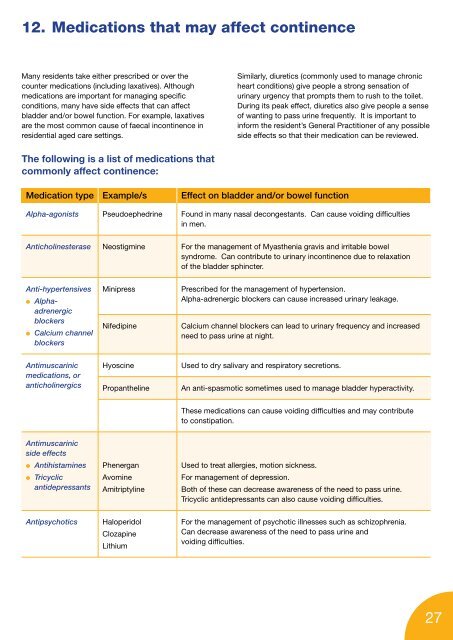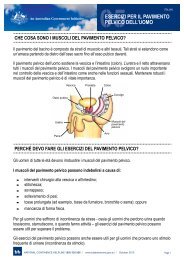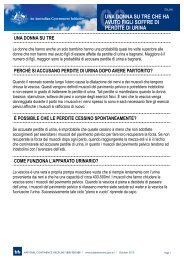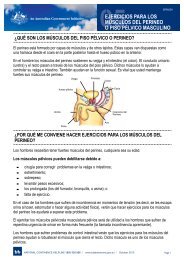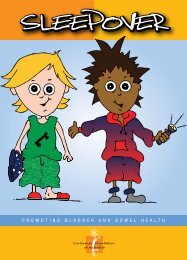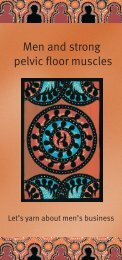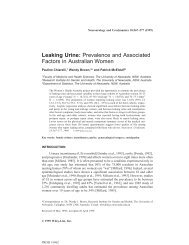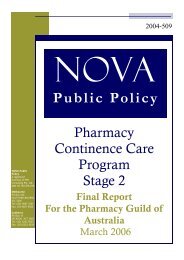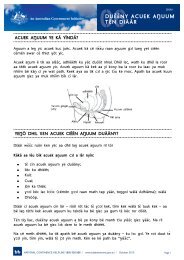Continence Tools for Residential Aged Care - Bladder and Bowel ...
Continence Tools for Residential Aged Care - Bladder and Bowel ...
Continence Tools for Residential Aged Care - Bladder and Bowel ...
Create successful ePaper yourself
Turn your PDF publications into a flip-book with our unique Google optimized e-Paper software.
12. Medications that may affect continence<br />
Many residents take either prescribed or over the<br />
counter medications (including laxatives). Although<br />
medications are important <strong>for</strong> managing specific<br />
conditions, many have side effects that can affect<br />
bladder <strong>and</strong>/or bowel function. For example, laxatives<br />
are the most common cause of faecal incontinence in<br />
residential aged care settings.<br />
The following is a list of medications that<br />
commonly affect continence:<br />
Similarly, diuretics (commonly used to manage chronic<br />
heart conditions) give people a strong sensation of<br />
urinary urgency that prompts them to rush to the toilet.<br />
During its peak effect, diuretics also give people a sense<br />
of wanting to pass urine frequently. It is important to<br />
in<strong>for</strong>m the resident’s General Practitioner of any possible<br />
side effects so that their medication can be reviewed.<br />
Medication type Example/s Effect on bladder <strong>and</strong>/or bowel function<br />
Alpha-agonists Pseudoephedrine Found in many nasal decongestants. Can cause voiding difficulties<br />
in men.<br />
Anticholinesterase Neostigmine For the management of Myasthenia gravis <strong>and</strong> irritable bowel<br />
syndrome. Can contribute to urinary incontinence due to relaxation<br />
of the bladder sphincter.<br />
Anti-hypertensives<br />
● Alphaadrenergic<br />
blockers<br />
● Calcium channel<br />
blockers<br />
Antimuscarinic<br />
medications, or<br />
anticholinergics<br />
Antimuscarinic<br />
side effects<br />
● Antihistamines<br />
● Tricyclic<br />
antidepressants<br />
Minipress Prescribed <strong>for</strong> the management of hypertension.<br />
Alpha-adrenergic blockers can cause increased urinary leakage.<br />
Nifedipine Calcium channel blockers can lead to urinary frequency <strong>and</strong> increased<br />
need to pass urine at night.<br />
Hyoscine Used to dry salivary <strong>and</strong> respiratory secretions.<br />
Propantheline An anti-spasmotic sometimes used to manage bladder hyperactivity.<br />
Phenergan<br />
Avomine<br />
Amitriptyline<br />
Antipsychotics Haloperidol<br />
Clozapine<br />
Lithium<br />
These medications can cause voiding difficulties <strong>and</strong> may contribute<br />
to constipation.<br />
Used to treat allergies, motion sickness.<br />
For management of depression.<br />
Both of these can decrease awareness of the need to pass urine.<br />
Tricyclic antidepressants can also cause voiding difficulties.<br />
For the management of psychotic illnesses such as schizophrenia.<br />
Can decrease awareness of the need to pass urine <strong>and</strong><br />
voiding difficulties.<br />
27


